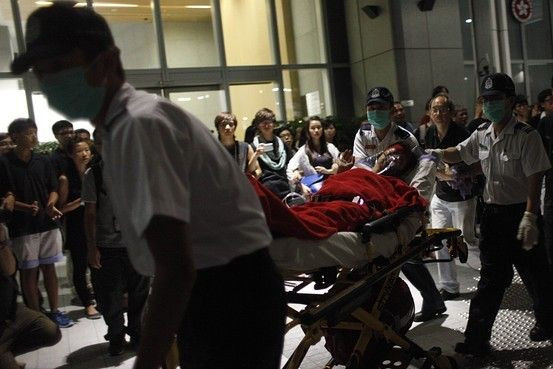Hong Kong Parents And Students Protest "Brainwashing" Attempts By Chinese Communist Party

Parents of school-age children and students in Hong Kong are into day six of protests and day three of hunger strikes to speak out against a new education curriculum that the Chinese government is calling "patriotism classes."
The classes are supposed to teach children the history and ideology of the Chinese Communist Party. The protestors have likened these new classes to "brainwashing" by the Communist party.
A spokesman for the parents' group, Lam Man-wa, told the Telegraph that the fast would continue "indefinitely" outside the Hong Kong Legislative Council offices.
"There's a huge mistrust between the central government and the Hong Kong population in general," Lam told CNN.
Hong Kong's Chief Executive Leung Chun-ying said on Tuesday that dropping the curriculum was not an option, but also added that "between withdrawing and not withdrawing the subject, the room for negotiation is very big."
A man named Andy Tsoi, who brought his seven-year-old daughter to the protest, told the English-language Chinese business news outlet Morning Whistle that he was not convinced that the new "moral and national education" would present a "balanced picture."
"They're just giving us one side, but not everything is just good or bad," Tsoi told Morning Whistle. "You can't use just one side to educate your children."
Cheung Yui Fai, a director at the Hong Kong Professional Teachers' Union, criticized the government for acquiescing to Beijing.
"This is strange, very strange," Cheung told BBC.
"I think it is odd for the government to stand so firmly when there is clearly so much opposition. It makes people think it is carrying out a political mission on behalf of the central government in Beijing."
Some Hong Kong observers believe this conflict could have profound consequences for the island's future.
"We are sitting on a volcano," said Dixon Sing, an associate professor at the Hong Kong University of Science and Technology, according to BBC.
"Beijing is trying to speed up the process of integrating Hong Kong in the cultural sense, ahead of elections when everyone gets to vote."
The new classes are supposed to be mandatory or fully implemented in the region by 2015, but the protestors are afraid that this represents further encroachment by the Beijing government on Hong Kong's autonomy.
Thus far, only six of Hong Kong's 600 elementary schools said they would teach the classes this year, according to the Telegraph.
The school year started on Monday.
© Copyright IBTimes 2025. All rights reserved.





















